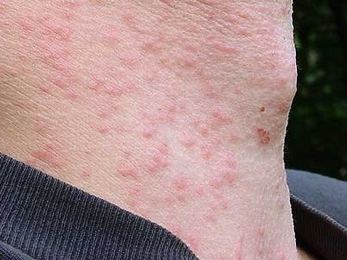
Oak processionary moth nest (c) Forestry Commission
Oak Processionary Moth
The caterpillars (larvae) of oak processionary moth (OPM) are pests of oak trees and can be a hazard to human and animal health. OPM was first accidentally introduced to England in 2005, and has been spreading out from London to surrounding counties including Hertfordshire. It is subject to a government-led programme of survey and control to minimise its population, spread and impacts.
Below you'll find information on what to do if you find OPM.
Threat to trees
OPM is a tree pest because its caterpillars feed on the leaves of several species of oak trees. This can leave trees more more vulnerable to other pests and diseases, and to other stresses, such as drought.
Threat to people and animals
Older caterpillars develop tiny hairs containing an urticating, or irritating, protein called thaumetopoein. Contact with the hairs can cause itching skin rashes (pictured below) and eye irritations, sore throats, breathing difficulties and, rarely, allergic reactions in people and animals. The risk of exposure to these hairs is highest in May and June.
The caterpillars can shed the hairs when threatened or disturbed. The hairs can be blown by the wind, and they accumulate in the caterpillars’ nests, which can fall to the ground. They can stick to trunks, branches, grass and clothing.
Report a sighting
If you see an OPM nest or caterpillar, please
- do not touch or approach OPM nests or caterpillars;
- do not let children or animals touch or approach nests or caterpillars;
- do not try removing nests or caterpillars yourself; and
- see a pharmacist for relief from skin or eye irritations after suspected OPM contact; or
- call NHS111 or see a doctor if you think you or someone in your care has had a serious allergic reaction - tell the doctor you suspect OPM contact.
If the sighting is on one of our nature reserves, please report the sighting to the Trust:
T: 01727 858 901
E: info@hmwt.org
If you see an OPM nest or caterpillar outside one of our reserves, please report it to the Forestry Commission.
OPM gallery
Find out more
You can find out more information on OPM on the Forestry Commission website.



